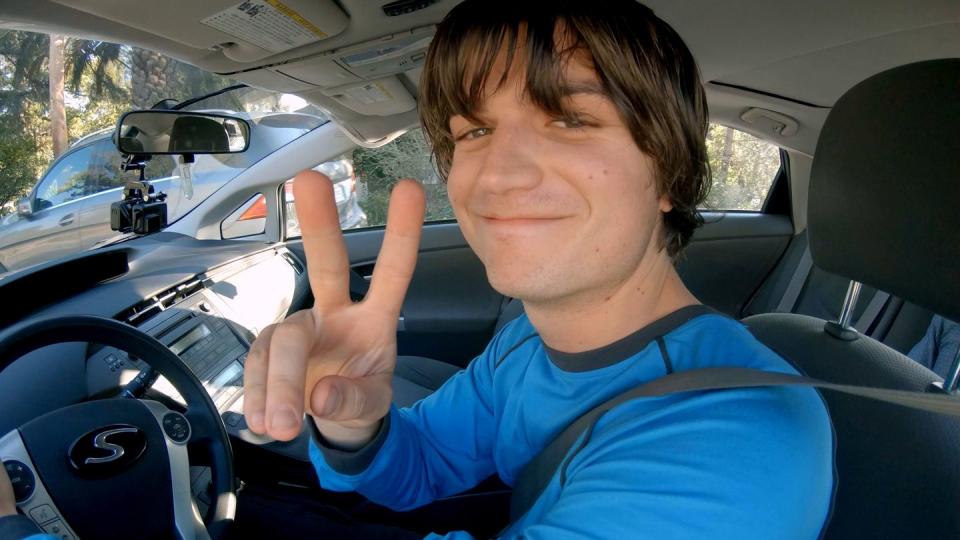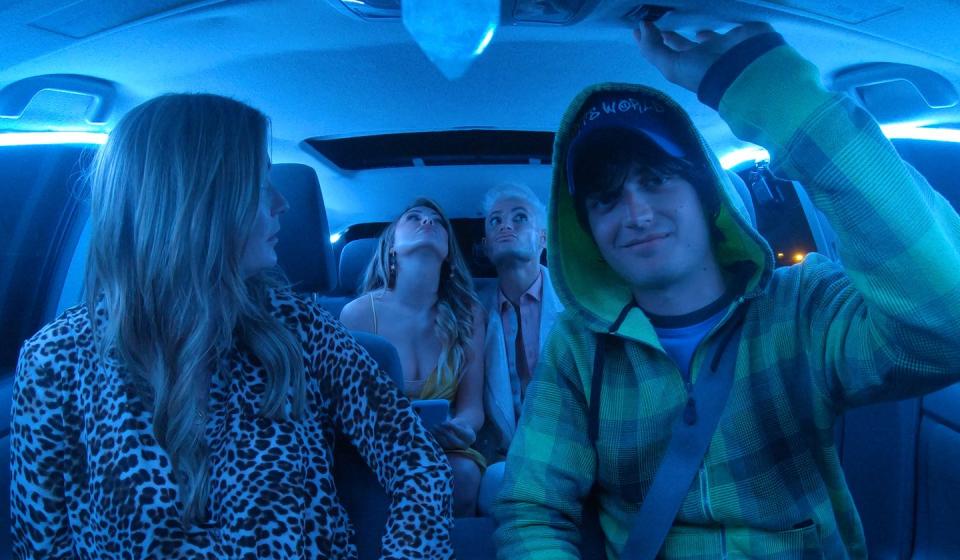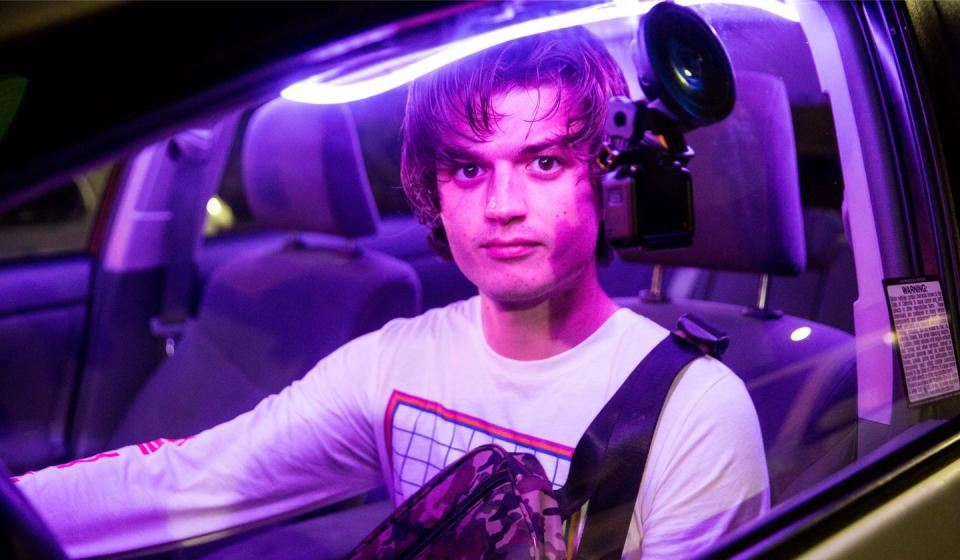'Stranger Things' Star Joe Keery On The Darkness Of Fame And His New Social Media Satire

Joe Keery is famous. As in, millions of Instagram followers, pursued-by-paparrazi, Daily Mail sidebar-of-shame famous. This is a fairly recent development for the 28-year-old. Five years ago, Keery had only had a few small television roles and appearances in adverts for KFC and Dominos pizza on his acting CV. Nobody was stopping him in the street. Then he was cast as Steve in Netflix's Eighties-inspired, Spielberg-tinged, supernatural series Stranger Things. It was, to put it mildly, kind of a big deal. Suddenly, so was he.
Now, there are corners of the internet dedicated to documenting what he does and finding out where he is; Twitter accounts called 'Joe Keery Brasil' and 'Joe Keery Updates', which have been created in his honour. As anyone with a modicum of self-awareness should, he finds this all a little strange.
In this, he differs from the character he plays in his new film, Spree, a social media satire packaged as gonzo-style Black Mirror slasher. As Kurt, he desperately courts online fame at any cost, from kidnap to torture and murder. Stranger Things this is not.
Earlier this week, over a Zoom call from Los Angeles, Esquire spoke to Keery about the spectacle of tragedy on social media, his own experience of fame and fandom, and how difficult it is to put down your phone.
What about playing Kurt interested you?
When I read the script my first thought was how somebody would pull this off. It rides this delicate line of the message it’s trying to deliver so you really need to have a filmmaker who knows what they are doing. Once I met Eugene [Kotlyarenko, the director] we shared a lot of thoughts about the character and I saw he really had the whole movie already inside him.
How did you get under the skin of the character?
I made a lot of prep videos playing an influencer, which appear in the movie. I also spent time researching these ‘single digit influencers’ and trying to immerse myself in that world. There’s kind of an internet dialect, especially in the tutorial videos where people are talking to their audience. Another thing that helped crack the character was thinking about Kurt as a helper who is helping through sharing. He thinks he’s helping others but he’s really just trying to help himself. That really unlocked understanding him.
So much of the movie is you filming yourself on a smartphone. What was that like?
The cameras that we used were not made for shooting a feature film so I really enjoyed that technical challenge. There’s a couple of body-cam scenes which were probably the hardest to do because you have to operate without seeing what you’re shooting. It felt very present when we were shooting, and there was so much going on with me operating cameras and driving that there almost wasn’t time to really think about it all.

Kurt is an uncomfortable figure to watch, were you aware of not overdoing the acting?
My hope was that, in the first 45 minutes of the film, you see a little bit of your own desperation for connection through social media. Then in the back half of the film, when he really turns into a monster, it hopefully makes you re-evaluate your own relationship with social media and how it makes you feel validated.
What else do you think the film says about social media?
Social media is so embedded in our culture and it happened so fast. The film is about what happens when this tool falls into the hands of someone who doesn’t know how to cope with it, or how to cope with rejection or loneliness, which is something happening a lot in our world. I think if you’re thinking about it in a couple of days then the film did its job. The high school shooter manifesto videos and that desperation for infamy was a big influence also, and the work of the film is to take those people down a peg but to show that it’s also a really serious issue in our country.
The film touches on the outrage reaction and counter-reaction of the media news cycle in response to those kind of events.
It makes you think that there is a story as complex and crazy as this story behind every one of those headlines that you just scroll past. That’s what it did for me – you’re so micro in the story but then at the end you zoom out and it’s just one little piece of a massive issue.
Some of Kurt’s passengers and eventual victims are hard to sympathise with. Why do you think that is?
It was my impression that it was to get a slice of the entire population so it feels like a microcosm of the internet and culture. When Jesse Adams [Saturday Night Live's Sasheer Zamata] comes into the Spree we finally have a hero – one who is addicted to social media and uses it for her own reasons – but still somebody who we can root for.

Shows like Euphoria and films like Eighth Grade have got to grips with representing the way Gen Z use the internet. Why do you think it’s often done so badly?
If I, at 28, feel like I’m already starting to become disconnected from the internet, I can’t imagine how it must feel if you’re older because it’s just moving exponentially fast. I think you have to really have your finger on the pulse and Eugene has such a deep understanding of the internet. A lot of his films deal with social media and are shot on phones and so I think it’s just something he’s really interested in exploring.
Do you make an effort to disconnect from your phone?
Yeah for sure, but every part of our lives from your bank to your camera is through your phone so it’s difficult to disassociate from it. It’s a great connector in a lot of ways but in social situations you should really not be using your phone.
At one point Kurt says “if you’re not documenting yourself you don’t exist”. Is that something you recognise in your friends?
I have some little sisters and I think it’s about five years younger than me that are really feeling that majorly, but there are definitely people my age that feel that way. It’s one of the saddest lines in the film and it’s one that really stuck out for me because it’s so early on.
For most actors fame is a by-product whereas influencers want fame in itself. Do you see that as a strange thing to court?
That’s not the reason why I’m an actor – I just wanted to make a living doing it. Our culture is so centred around fame and it’s a really dark thing, that’s another thing to think about and evaluate.

Was there a moment you noticed yourself becoming more famous?
Day to day not really but there would be more people coming up to me and saying they liked Stranger Things. I did notice it through social media though. Isn’t it weird that that’s the qualifier these days? ‘You’ve got a really big following you must be well known’. Doing this movie made me feel a lot more distant from social media and it’s really made me question whether I validate myself through it and what I’m using it for.
This interview has been edited and condensed for clarity
Spree is in cinemas 14 August
Like this article? Sign up to our newsletter to get more articles like this delivered straight to your inbox
You Might Also Like

